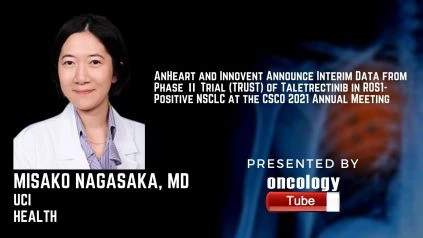Misako Nagasaka, MD, Ph.D. UCI Health speaks about AnHeart and Innovent Announce Interim Data from Phase â…¡ Trial (TRUST) of Taletrectinib in ROS1-Positive NSCLC at the CSCO 2021 Annual Meeting.
AnHeart Therapeutics Co., Ltd, a clinical-stage biopharmaceutical company focused on developing novel first-in-class or best-in-class precision oncology therapeutics, and Innovent Biologics, Inc., a world-class biopharmaceutical company focused on developing, manufacturing, and commercializing high-quality medicines for the treatment of cancer, metabolic, autoimmune, and other major diseases, announced today interim clinical data from a Phase II trial (TRUST) evaluating t (NSCLC). On September 25-29, 2021, the findings will be presented as a keynote presentation at the Chinese Society of Clinical Oncology (CSCO) 2021 Annual Meeting.
“Taletrectinib (AB-106): Preliminary results from TRUST, Phase II trial of a new generation of potent ROS1/NTRK inhibitors in ROS1-positive non-small cell lung cancer (NSCLC),” detailed preliminary data from taletrectinib’s current Phase II trial (NCT04395677).
As of June 16, 2021, ROS1 fusion positivity had been identified in 21 crizotinib treatment-naive patients and 16 crizotinib pre-treated patients. The following are the main findings:
* The confirmed objective response rate (ORR) was 90.5 percent (19/21) and the disease control rate (DCR) was 90.5 percent (19/21) in the crizotinib treatment-naive patient group (n=21).
* The verified ORR was 43.8 percent (7/16) in the crizotinib-treated patient group (n=16), and the DCR was 75.0 percent (12/16).
* Three patients with ROS1 G2032R resistant mutations were discovered in the crizotinib-pretreated patient group (n=16), and all three patients had tumor regression, two patients had partial responses (PR), and one patient had stable disease (SD).
* The intracranial objective response rate (evaluated by the investigator) was 83.3 percent (5/6) in patients with assessable brain metastases before to participation.
* Taletrectinib was well tolerated, with gastrointestinal side effects being the most common, with reversible aspartate aminotransferase (AST) and alanine aminotransferase (ALT) levels rising.

